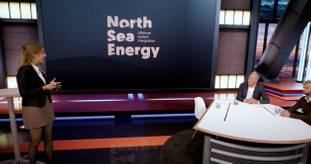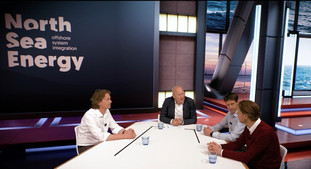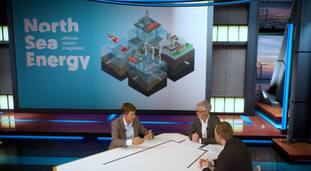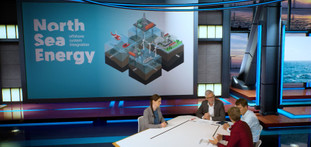Dive into …. Energy transition on the North Sea!
A series of webinars about the road(map) towards an integrated offshore energy system.
The North Sea region is set to take on the role of ‘Europe’s green power plant’. In the coming decades new energy concepts will be developed while strengthening the carrying capacity of our economy, society and nature and human capital aspects. The future energy system requires the massive roll out of offshore wind capacity, combined with emerging technologies for offshore solar, offshore hydrogen developments (incl production, transport and storage) and CCS, as well as the orderly phase-out of natural gas exploration and production. Our recently recorded webinar series highlights the main results of the North Sea Energy Program research focussing on the challenges of offshore system integration and the benefits of an integrated and coordinated approach for the North Sea. In five episodes in the style of a 30 minute tv talk show, hosts Rene Peters, Marcel Hoenderdos and George Wurpel discuss with energy experts the development of concepts for offshore energy system integration. In an informative set up they highlight challenges and opportunities to unlock the low-carbon energy potential of the North Sea with optimal value for society and nature. Read the full reports of the research work
In episode 1, NSE energy experts Rene Peters and Joris Koornneef elaborate on the progress of the North Sea Energy program. They highlight the steps towards a roadmap for offshore system integration as input for decisions in the near future about the energy system in the longer term. The webinar is hosted by George Wurpel.
In episode 2, NSE energy expert Rob van Zoelen dives into North Sea Energy Hubs, which are expected to be important stepping-stones for large-scale system integration and are therefore at the centre of the NSE program. Lisa van Nieuwkoop explores the main challenges when it comes to governance, an important element when bringing new concepts into practice. The webinar is hosted by Rene Peters.
Episode 3 focuses on one of the most important innovations and a central element in the NSE programme: the North Sea Energy Atlas. Remco Groenenberg explains where we are with developing this open access IT toolbox enabling users to develop their own cross-sectional scenarios in any desired composition of offshore energy system elements. In addition, Sebastiaan Hers shares an analysis of the international energy system, the market dynamics of the North Sea region and the techno-economic potential of an offshore integrated energy system. The webinar is hosted by Rene Peters.
Episode 4 focuses on the production and transport of offshore hydrogen and the effects of digitalisation. Offshore logistics play a key role in ensuring the safe and efficient installation, operation and decommissioning of offshore energy systems. Knowledge and experience will benefit the offshore hydrogen developments. Jonah Poort and Joris Koornneef inform you about the challenges and potential benefits of shared, optimized logistics between offshore oil and gas and wind sectors and on the safety issues that should be addressed. The webinar is hosted by Marcel Hoenderdos.
In episode 5, we dive into balancing the aim for multiple offshore energy initiatives and their impact on the ecological and environmental systems in the North Sea area. Our experts Mara Hauck, Anne-Mette Jørgenson and Joris Koornneef will share how decisions in the development and planning of the North Sea can be guided and adverse ecological and environmental effects can be reduced. The webinar is hosted by Marcel Hoenderdos.
Video's:
Watch these 10 short VIDEOS with the highlights from previous work packages (2021).
1. Introduction to the North Sea Energy Program
2. Energy Hubs
3. Governance and Standardization
4. Stakeholder Perspectives
5. Safety, Integrity and Reliability
6. Ecology and Environment
7. Offshore Logistics
8. Markets and Modelling
9. An interactive North Sea Energy Atlas
10. Roadmap to an Integrated System in 2050.




